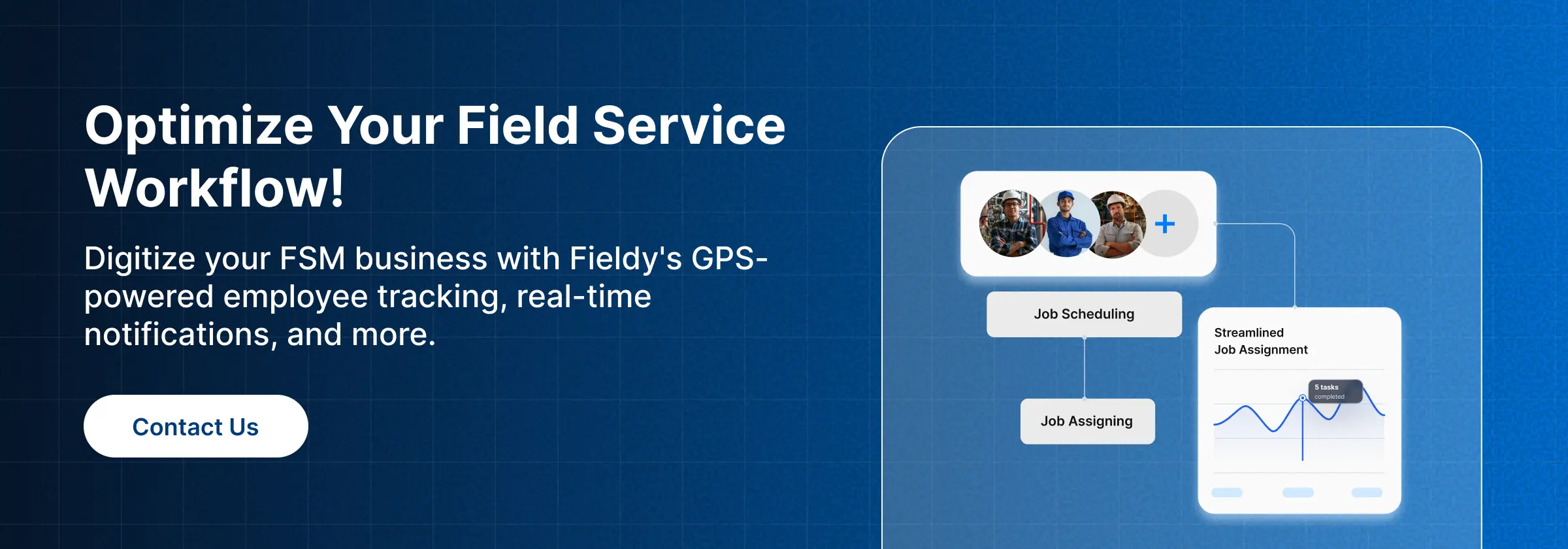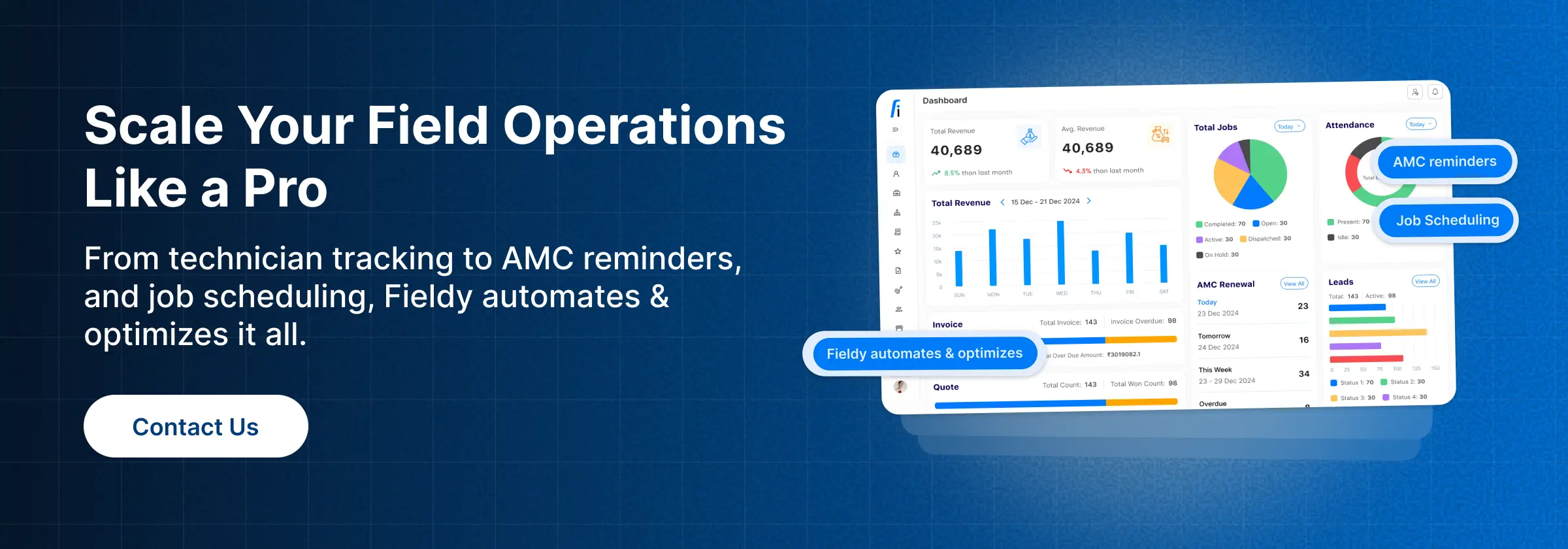Introduction
Enterprise Legacy vs. Field-First Simplicity
The powerhouses of enterprise packages and lightweight, field-first packages have fought for dominance in the field-service-management market. In many ways, Salesforce FSM dominates the enterprise CRM market, featuring a robust yet complex toolset. On the other hand, Fieldy has emerged as a mobile-first modern-day FSM platform designed for contractors, service providers, and growing franchises.
So, the difference? Being an extension to the bigger CRM ecosystem, Salesforce FSM is, indeed, powerful, but too bulky for everyday field service. Meanwhile, Fieldy is a stripped-down, focused version that features real-time live GPS tracking, predictive scheduling, and automation that benefit field productivity.
Market Research Future states that the global field service management market is expected to register a high-growth CAGR of 19.7% during 2023-2030, with most of the adoption coming from SMBs. The main catalysts driving this growth are businesses demanding faster deployment, mobile-first tools, and cheaper automation, and that’s exactly the wall where Fieldy works wonders.
Fieldy vs Salesforce FSM – Side-by-Side Feature Comparison
See why growing service teams are choosing Fieldy over bulky enterprise tools like Salesforce FSM:
Key Features: Fieldy vs Salesforce FSM
When evaluating Fieldy and Salesforce FSM, it’s clear that while both tools aim to streamline field service operations, their setup process, pricing models, and usability differ significantly. Fieldy is built for instant adoption with a no-code interface, while Salesforce FSM often demands weeks of consultant-led configuration before going live.
| Feature ⚙️ | Fieldy 🚀 | Salesforce FSM 🏢 |
|---|---|---|
| ⚡ Setup Time | ✅ Instant, No-Code⚙️ | 🚫 Weeks with Consultants⏳ |
| 💰 Pricing Transparency | ✅ $20–$25/user – Flat💼 | 🚫 Varies, CRM Bundled |
| 📍 Real-Time Technician Tracking | ✅ GPS + Live Updates | 🚫 Add-On Required➕ |
| 📶 Offline Mobile Support | ✅ Full Offline Capability | ⚠️ Basic Offline Mode |
| 📝 Job Card Automation | ✅ One-Click with ✍️ Signature Capture | 🔧 Custom Setup Needed |
| 📑 AMC & Contract Management | ✅ Built-In Flexibility | 🚫 Requires Custom CRM Objects📂 |
| 🛠️ No-Code Workflow Builder | ✅ Drag-and-Drop Templates🖱️ | 🚫 Developer Dependency👨💻 |
| 📦 Inventory Updates | ✅ Real-Time From Field📍 | 🚫 Complex Multi-App Sync🔀 |
| 💬 Field Communication | ✅ WhatsApp + SMS Built In | 📧 Email (Custom SMS/Chat Add-On) |
| 🔑 Role-Based Access | ✅ Easy to Configure | 🚫 Admin-Level Setup🛡️ |
| 🌐 Multi-Branch / Franchise Support | ✅ Turnkey Branch Dashboard📊 | 🏢 Enterprise Tier Only |
| 🎓 Training Time | ✅ 1 Day or Less⏱️ | 📅 Weeks |
| 📜 Lock-In Contracts | 🚫 None | 📆 Annual Licensing |
Why Fieldy Is the Smarter Alternative to Salesforce Field Service
Purpose-Built for Field Teams – Not CRM Bloat
- Best suited for full Salesforce CRM users — Salesforce FSM works best as part of the complete Salesforce CRM suite.
- Higher cost of ownership — You’ll be paying for tools and modules you might never use.
- Ideal for large enterprises — Works well for organizations with complex customer databases.
- Not always SMB-friendly — Smaller and mid-sized service teams often find it overwhelming to set up and manage.
Fieldy, on the other hand, was designed specifically for:
- Job dispatch and technician tracking
- AMC and contract lifecycle automation
- Franchise and multi-location oversight
This laser focus means faster adoption, lower costs, and higher operational efficiency.
Fieldy Delivers More Value Without Complexity
Deploying Salesforce field service software typically involves:
- Hiring certified consultants
- Paying for third-party apps
- Relying on developers for workflow changes
With Fieldy, everything is built-in:
- Instant job scheduling
- Contract renewal automation
- No-code checklists and workflows
- Zero setup fees
You can be live in one day, compared to 4–8 weeks with Salesforce FSM.
Real-Time Control vs Post-Processed Data
- Live updates with limitations — While Salesforce FSM can display live updates, it often relies on post-processed backend data sync.
- Data delay concerns — This setup can cause a lag between field activities and what office teams see.
Fieldy’s GPS tracking and job updates happen in real time via the technician’s mobile device. This gives dispatchers and managers immediate insights into:
- Job progress
- Technician location
- Inventory usage
Fieldy vs Salesforce FSM: Pros & Cons Expanded
Fieldy Pros
- Real-Time Live GPS Tracking, No Extra Hardware Required
Fieldy leverages mobile-based GPS for live technician location tracking. There’s no need for GPS devices or telematics, significantly cutting startup costs and simplifying deployment. - Affordable Flat-Rate Pricing
Users pay a predictable $20–$25 per technician per month. This model works especially well for rapidly growing teams and multi-branch businesses looking to budget effectively without hidden fees. - AMC and Contract Automation Built-In
Fieldy automates annual or recurring contracts, renewal alerts, scheduling, and invoicing, eliminating manual follow-ups and strengthening recurring revenue streams. - Franchise-Ready Dashboards for Multi-Location Teams
Fieldy includes centralized dashboards that allow HQ or regional managers to monitor job progress, team productivity, and SLAs across multiple locations, perfect for franchise models. - One-Day Deployment, No Lock-Ins
Thanks to its user-friendly interface and no-code setup, Fieldy can be fully operational in as little as one day. And there are no long-term commitments; users can adjust licenses month-to-month.
Fieldy Cons
- Smaller Integration Library Compared to Salesforce FSM
While Fieldy integrates with key platforms, Zoho, Salesforce, QuickBooks, Xero, ERP systems, the depth and breadth of prebuilt connectors are still growing compared to the extensive ecosystem Salesforce offers. - Less Brand Recognition in North America
Fieldy is newer on the scene, so it may not have the same reputation or widespread adoption that Salesforce does in established markets. That said, its rapid growth suggests it’s closing the gap fast.
Salesforce FSM Pros
- Deep CRM Integration for Customer History & Analytics
Built into the robust Salesforce ecosystem, Salesforce FSM seamlessly connects service operations with customer support, marketing, and sales data, giving a holistic view of customer interactions. - Wide Library of Enterprise-Grade Integrations
Salesforce FSM benefits from one of the largest app marketplaces (AppExchange), offering prebuilt integrations across finance, HR, logistics, and more, useful for complex enterprise systems. - Scalable for Larger, Complex Organizations
Designed to support nationwide or global operations, Salesforce FSM scales sync flows and dashboards to accommodate hundreds or thousands of field technicians across regions. - Robust Reporting & Analytics
Salesforce offers powerful reporting features, dashboards, BI tools, and analytics templates that can be customized to generate insights by customer, region, service type, and more.
Salesforce FSM Cons
- Expensive Licensing for Smaller Teams
Even the base license can be costly for small service businesses. Full access often requires multiple Salesforce add-ons, making it a substantial investment. - Requires Extensive Setup & Training
Customizing Salesforce FSM usually involves certified consultants and internal IT teams. Training team members can take weeks, delaying return on investment. - Many Features Locked Behind Add-Ons or Higher Tiers
Advanced dispatching, comprehensive mobile features, and communication tools often require upgrading to enterprise-tier licenses, not always necessary for smaller operations. - Real-Time Tracking May Need Extra Modules
Although Salesforce FSM supports real-time location updates, this feature typically requires additional setup or hardware, complicating deployment. - Not Optimized for Rapid Multi-Location Deployment
For franchises or service chains needing quick branch onboarding, Salesforce can feel sluggish; it’s built for enterprise customization, not immediate field scaling.
Who Should Choose Fieldy Over Salesforce FSM?
Fieldy is the better choice for:
- SMBs to mid-market companies wanting speed, automation, and affordability
- Contractors, HVAC, plumbing, solar, and electrical service firms needing AMC management and dispatch
- Franchise and multi-location operators looking for a turnkey dashboard without custom enterprise builds
Salesforce FSM is more suitable for:
- Large enterprises with a heavy CRM dependency
- Businesses already invested in the full Salesforce ecosystem
- Operations with dedicated IT and admin teams
Final Verdict
Fieldy Simplifies What Salesforce Overcomplicates
The best field service management software is the one that aligns with your operations today and scales with your growth tomorrow. While Salesforce field service software offers unmatched CRM integration for enterprise players, Fieldy wins for 2026 as the more agile, affordable, and field-first platform.
Why Fieldy Wins:
- Live technician tracking without extra hardware
- Affordable, transparent pricing
- Built-in AMC, dispatch, and contract automation
- 1-day onboarding, no consultants, no delays
Stop paying for features you’ll never use. With Fieldy, you get exactly what your field teams need: faster dispatches, automated contracts, and real-time technician tracking, all in one intuitive dashboard.
Switch to Fieldy today and start running a smarter, leaner, and more profitable field service business by tomorrow.
Industry Insight – The FSM Market in Numbers
- 63% of service companies say mobile-first tools have improved first-time fix rates (Field Service News).
- 52% of contractors report that automation has reduced their job completion times by at least 20%.
- By 2028, over 70% of SMB field service teams are expected to adopt FSM software with no-code workflow builders.
FAQs – Fieldy vs Salesforce FSM:
What makes Fieldy better than Salesforce field service software for SMBs?
A: Fieldy’s flat-rate pricing, instant setup, and real-time tracking make it ideal for SMBs. Unlike Salesforce FSM, it doesn’t require consultants, hardware, or long onboarding.
Can Fieldy integrate with accounting tools like QuickBooks and Xero?
A: Yes. Fieldy integrates with QuickBooks, Xero, Zoho, Salesforce, WhatsApp, and ERP APIs, offering enterprise-level connectivity without complexity.
Does Salesforce FSM offer real-time technician tracking like Fieldy?
A: Salesforce FSM can track technicians, but real-time updates often require add-ons or hardware. Fieldy delivers this instantly via mobile GPS with no extra cost.
Which platform is faster to implement, Fieldy or Salesforce FSM?
A: Fieldy can be deployed in one day with no-code workflows. Salesforce FSM may take 4–8 weeks, often involving paid consultants.
Is Fieldy suitable for multi-location or franchise businesses?
A: Yes. Fieldy includes a franchise-ready dashboard for multi-branch oversight, a feature that requires enterprise-tier customization in Salesforce FSM.




